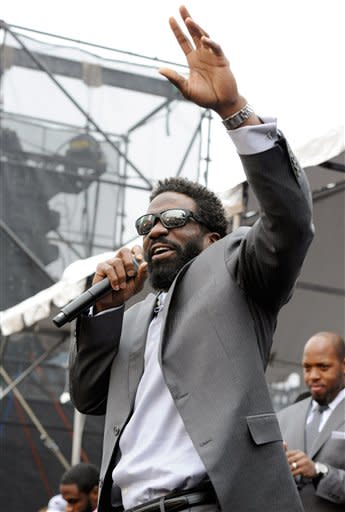Ravens' Ed Reed reflects contradictions of NFL's head injury issues
NEW ORLEANS – Ed Reed is 34 now and he hopes that his tendency of late to forget simple things, or get confused about something easy, is just a sign of middle age approaching.
"Who [doesn't] wake up and forget things?" the Baltimore Ravens' future Hall of Fame safety said with a wistful laugh.
Deep down, though, he fears something else is at work. The man plays football for a living and he plays it violently, all those collisions over the middle, all those bone-jarring tackles. He's had just three diagnosed concussions he said, although he acknowledged there "may be more that you don't really know about."
And so Reed offers this startling revelation: He isn't just fearful that he may one day suffer from brain injuries caused by football, he thinks he's already dealing with them.
"I think some things I go through [right now] are football related," Reed said Wednesday. "There's been some thing that honestly put up a flag. Just stuff that I know, stuff that I know I've been through, minor [things where I said,] 'Oh, my, this might be because I've been playing football so long.'
"I'm sure there is going to be something related to football."
[Related: Ray Lewis 'agitated' over report tying him to deer-antler spray]
Across New Orleans this week in the run-up to Super Bowl XLVII, it seems every conversation winds up on head injuries. The league, from executives to coaches to players, is concerned. No one is denying the threat is real. No one has a solution either.
Players can only sit and wonder if they'll be the lucky ones that survive the game with their health intact. And they can only attempt to push aside the terror that they face a life incapacitated with ALS or some other horror story that some of their predecessors are going through. No one wants to be featured on one of those "HBO Real Sports" segments.
It's an enormous game of roulette and no one has any idea what's coming. To listen to Reed discuss his past, present and uncertain future is to hear a man face reality while still in denial, a man who is both concerned and hopeful, a man too smart and articulate to pass on honestly discussing the issue, a man trying to play mind games on himself to make his continued play seem like the proper choice.
"None of us know our time," he notes. "None of us know how we are going to go. None of us know when that hour is going to come and how it is going to come to us."
That rationalization gets him on the field, it doesn't silence his concerns.
"I [fear] for my family," Reed acknowledged. "For my family to have to go through that if it happens, God forbid. But any family that has to go through that. Any player that ever played in this league would hate that for their family to go through that."
[

Yahoo! Sports Radio: Christian Okoye laments end of ground-and-pound days in NFL]
This isn't just outside groups or plaintiff's lawyers or even old players talking now. It's guys such as Reed, part of the current, active heart and soul of the league. He's a mess of contradictions. They all are.
Reed cheered on President Obama, who said if he had a son he might not let him play football. Yet in the next breath Reed said his son will be allowed to play if he wants, but only after he's provided proper information.

"We have to make sure we are educating our kids and people about what is going on vs. just saying, 'don't do this' or 'don't do that.' "
Some players think the game is in trouble. Others figure it'll go on forever. Back and forth it goes during Super Bowl week, from media conferences to private moments. It's a strange moment for the sport.
To Reed, this is the deal he made, the life he chose and perhaps that's where football will end up. At this stage, no one can start – or continue – playing the game without the knowledge that brain injuries are real and irreversible. He says he plays because it's what makes him whole. There's no other path for him. Everyone close to him understands that.
"[My family] always supports me, and they know if I can walk and talk and run, I'll be playing football," he said. "The decision is solely mine."
Reed wants no tears shed. He knows the risks. He sees the potential trouble. He plays. He thinks the sport is a dangerous occupation that the participants enter with eyes wide open. It's not the same as other worker safety situations, from coal mines to factory work.
This is truly an elective path.
"I signed up for this," Reed said. "I knew it was a contact sport. I know there's going to be pain and ailments and injuries. Do I want that to affect my [life]? No. But do I know it's going to affect it? Yes."
[Related: Marshall Faulk feels cheated over Spygate]
That's the sad, sobering reality. You wonder sometimes if you're talking to ghosts.
Here's a legend nearing the end of his career, seeking his first world championship, at the pinnacle of his long, hard fought and glorious run and he's forced to block out the moments when he fears that those recurring memory lapses aren't just the possible harbinger of something to come, but something sinister that is already here.
Other popular Super Bowl content on Yahoo! Sports:
• Randy Moss won't apologize for best-of-all-time boast
• Colin Kaepernick's movie choices show kid at heart
• Blocked punt is greatest moment in New Orleans sports history
